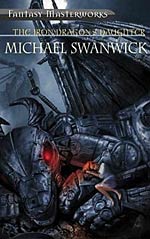
![]() DrPerschon
DrPerschon
12/22/2014
![]()
I was introduced to Michael Swanwick via The Dragons of Babel, the sequel to Iron Dragon's Daughter, and it has since acted as a cautionary tale to me about judging a book by its cover. I was expecting dark fantasy involving dragons like B-52 bombers, and the world of Iron Dragon's Daughter and Dragons of Babel is far from that. Finding the right words to describe Swanwick's twisted fantasy in a way that makes for simple categorization is difficult; consequently, I'll let my review be that description.
The novel begins in a dragon factory, a steampunk space with Dickensian waifs and overlords made up of faerie races from the Spiderwick Chronicles. But very early on, the reader discovers that this fantasy departs from both epic and dark fantasy traditions: the interests of the main character, a changeling girl named Jane, are not those of Frodo or Conan or Elric. There are grand designs, but she is a teenage girl in a fantasy secondary world. She is worried about the onset of menstruation, hoping to find a boyfriend, and shoplifts at the mall.
You read that right. The Mall. It's a place where time passes slower than elsewhere, which reveals both the utter mundanity of Swanwick's world, but also the sly, subtle humour that slips in from time to time. The fact that Elven nobles do a lot of cocaine is amother example of these things. Like our world, Swanwick's world can be downright ugly and brutal, but it often shines with tarnished rays of hope. It is not utterly bleak, but neither is it cloyingly optimistic.
While Swanwick openly stated that the Iron Dragon's Daughter is an homage to Tolkien, epic fantasy purists are likely to be sorely disappointed by Jane's adventures, as she gains freedom from the dragon factory and embarks on the difficult quest of (drum roll) growing up, surviving high school, going to college, and navigating the vagaries of young love. Don't mistake that plot line for a fantasy version of 90210: this is a smart, serious bit of fantasy, and challenges a contention I often hear, which is that Science Fiction handles the big ideas, and fantasy handles the fluff.
So while it is the sort of fantasy that conservative Tolkien fans are likely to hate, it certainly gave me a similar experience to my first steps in Middle-Earth so many years ago, before spaces like the Mines of Moria had become common fantasy settings. I felt a sense of wonder, a sense of stepping into a world I'd never been before. And for the widely-read fantasy reader, that's a very rare experience.
http://www.steampunkscholar.com